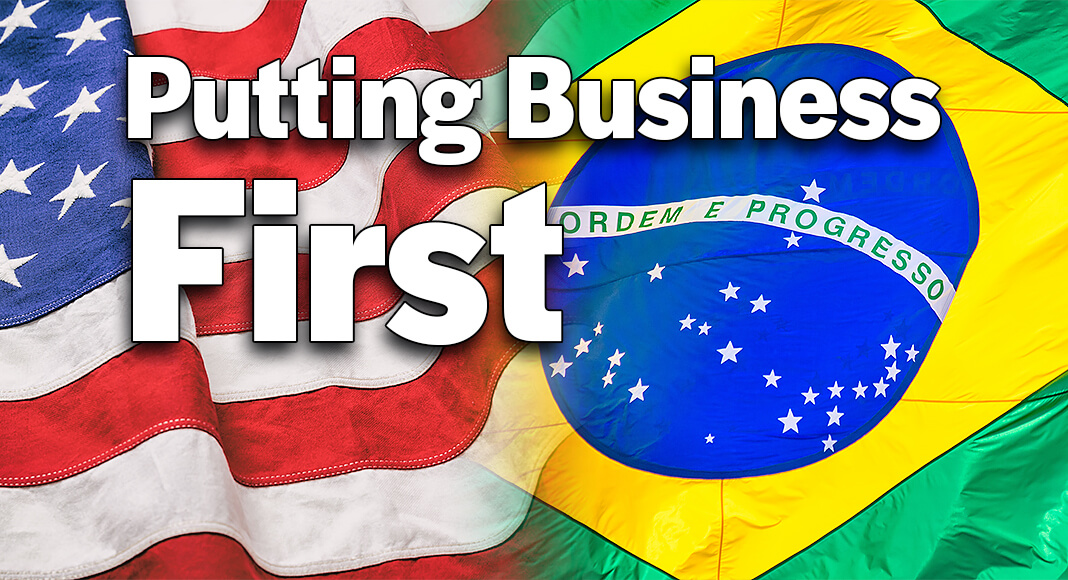
Texas Border Business
By Lambrini Kolios
Director, Brazil-U.S. Business Council
US Chamber of Commerce
Evident at the highest levels of government appointments and stated national security priorities, the Trump Administration’s reprioritization of the Western Hemisphere means that we cannot overlook Latin America’s largest economy: Brazil. In 2024, Brazil and the United States celebrated 200 years of bilateral relations, rooted in shared democratic values and deep economic ties.
The United States enjoys a trade surplus with Brazil, is the country’s second largest trading partner, and is its leading source of foreign direct investment. Nearly 130,000 jobs in the United States and 500,000 jobs in Brazil rely on bilateral exports, benefiting not only large enterprises but also many small and medium-sized businesses.
While the United States is adopting an inward-looking approach of “America First,” foreign policy should focus on areas of mutual benefit with allies in the region, and that means putting business first. Secretary of State Marco Rubio has emphasized that U.S. policy will be guided by the principles of making America safer, stronger, and more prosperous. These goals cannot be accomplished without the private sector, and to accomplish them, the new administration needs to put business squarely at the center of the U.S.-Brazil relationship.
The Brazil-U.S. Business Council (BUSBC), established in partnership with Brazil’s National Confederation of Industry (CNI), is uniquely positioned to represent the unified voice of the U.S. and Brazilian private sectors. Since 1976, the Council has been advancing trade and investment relations between the two countries, promoting meaningful interactions between business and government leaders to move the needle on key policy issues. To ensure a continued robust and reciprocal relationship, the BUSBC recommends the following actions to the new administration:
Leverage Dialogue to Build Stronger Partnerships
Strengthening relations between the United States and Brazil begins with convening the right stakeholders and fostering dialogue. Bilateral mechanisms such as the U.S.-Brazil High Level Dialogue, U.S.-Brazil Commercial Dialogue, and U.S.-Brazil Energy Forum, among others, should be leveraged to ensure continuity in how the governments engage both with each other and with the private sector. The BUSBC can serve as an interlocutor, collaborating with both governments to define policy priorities and facilitate exchanges and dialogues. The BUSBC urges the U.S. and Brazilian governments to promptly schedule such engagements with representation from the business community to achieve short and long-term collaborative efforts.
Harness Opportunities in Transformative Sectors
The BUSBC has identified areas for strategic alignment in key sectors including agriculture, energy, critical minerals, health, and digital economy—all sectors representing significant opportunities for business growth and that are shared priorities for both governments. By focusing on these sectors, the United States and Brazil can enhance energy security and infrastructure, secure supply chains to reduce reliance on external sources, and protect intellectual property to foster innovation. Joint efforts in the ICT sector can also drive advancements in artificial intelligence, cybersecurity, and digital health, improving technological outcomes while providing the stability and mutual benefits that the private sector seeks.
Strengthen Bilateral Trade by Reducing Barriers
While the United States and Brazil do not share a formal free trade agreement, the Agreement on Trade and Economic Cooperation (ATEC) provides a strong framework for advancing the trade and investment climate in both countries. In 2020, under President Trump’s directive, the ATEC Protocol was expanded to include a new Protocol on Trade Rules and Transparency, marking a significant step forward in bilateral trade relations. The BUSBC advocates for full implementation of the Protocol and recommends establishing a coordinating authority to conduct a comprehensive review of implementation progress. Furthermore, both governments should prioritize continued negotiations to expand the Protocol’s scope. This expansion should include the addition of a new chapter on digital trade and annexes addressing critical areas such as medical devices, pharmaceuticals, and supply chain resiliency. These additions are not only achievable but would also unlock significant opportunities for both nations.
Empower the Private Sector to Shape the Future
The business community has a critical role to play in shaping the future of the U.S.-Brazil relationship. The BUSBC stands ready to ensure that the voice of the private sector is heard and that commercial opportunities are realized. Bilateral mechanisms already exist as a successful tool to elevate conversations at the highest levels of government and drive meaningful change—we don’t need to reinvent the wheel. By leveraging existing forums, leaning into strategic sectors that provide mutual benefits, and focusing on ways to break down trade and investment barriers, we can bolster U.S.-Brazil relations by putting business first.
A full list of the Brazil-U.S. Business Council’s 2025 Policy Priorities, developed in partnership with our member companies, can be found here.















